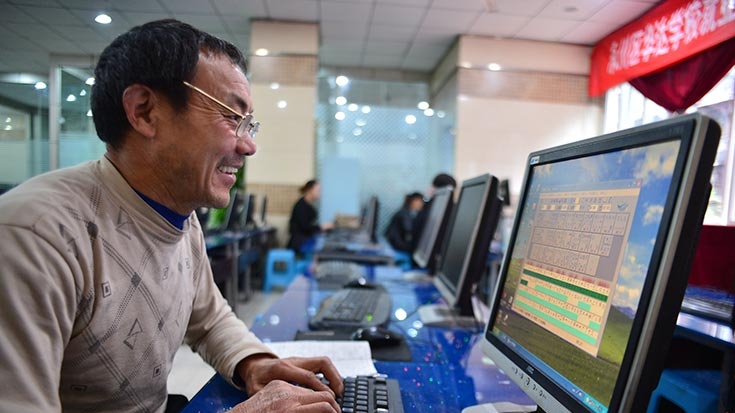Beijing, March 11, 2014 - China's central and provincial governments have launched a number of rural informatization initiatives over the years. These interventions aim to reduce the gap in information and communications technology between urban and rural areas. A workshop was held recently to showcase several interventions and seek ways to scale-up successful and sustainable models. Organized by China's National Development and Reform Committee (NDRC) and the World Bank, the workshop was attended by over 100 participants from a range of central and provincial government agencies involved in rural ICT as well as researchers and the private sector. The workshop also featured the launch of a report compiled by the State Information Center covering 21 cases of rural ICT interventions by central ministries, local governments, enterprises and farmers.
Featured presentations included:
- The use of wireless technology to provide "triple-play" services in Hunan province where geographical conditions inhibit the use of traditional wired technologies. The wireless service provides television, voice and Internet access to millions of rural inhabitants.
- The development of the Beijing Rural Management Information Project. Launched in 2000, the platform has networked government offices at the city, district, county, town and village level and is used by almost 7,000 officials to support rural government management and decision making.
- The Association of Suichang Shops was established in 2010 to exchange experience and best practice among the 1,000 online shops operated by citizens in the county. The association has worked to garner government support for the online merchants and reached an agreement with TaoBao, China's largest business to consumer e-commerce site, to create a special channel for rural products and services from Suichang.
- China's first traditional medicine e-commerce platform was launched in 2012 and has attracted 280,000 registered users, 2.400 enterprises and 9,000 traders. The platform employs more than 400 people in 300 branches nationwide and aims to stabilize prices for medicinal herbs by networking growers and wholesalers.
The workshop concluded that there were common factors leading to successful interventions. This includes clearly understanding the needs of rural residents and developing ICT solutions to satisfy them. With an eye to future, there are still some challenges with urbanization and advances in information technology requiring rural ICT models to adapt accordingly.
The event culminated several years of research led by the World Bank to better understand rural ICT access and use at the grass root level and recommend key directions for policy makers based on domestic and international best practice. Studies include a survey about ICT access and use in villages, an investigation of China's public libraries and the role they are playing in offering access and training to computers and the Internet and an analysis of how ICTs could help enhance the well-being of China's growing elderly population.
The ICT Demand Survey covered over 3,000 households in more than 200 villages in Guizhou, Jilin and Shandong provinces where only around a quarter of the villages surveyed had their own public facility for Internet access. The Library Landscape study shows that in these same provinces, over half of the villages have a library or a reading room and almost a third of them are connected to internet. But just over five percent of the villagers surveyed said they visited library in the previous year. The study on Elderly, ICTs and Libraries in China found that only six percent of China's elderly use the Internet.
A key obstacle to rural informatization is the lack of IT skills among villagers. Further, there are few suitable venues available to acquire digital literacy. Public libraries are used in a number of countries to successfully teach digital skills and provide Internet access. Once acquired these skills can enhance livelihoods for the rural population through better access to market information, online sales and employment possibilities, delivery of online public services and access to health and educational information.
Other investigative research carried out included an impact evaluation of three rural ICT interventions involving telecentres, agricultural text messaging platform and e-commerce and the feasibility of introducing ICT-enabled work platforms in rural areas. Key findings from the various studies have recently been published in the World Bank report Information and Communications in the Chinese Countryside: A Study of Three Provinces.

